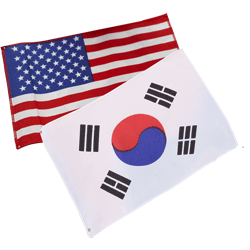

One of the major topics discussed
at the summit meeting between
South Korean President Moon
Jae-in and U.S. President
Donald Trump in June was, of course, the
Korea-U.S. Free FTA. Trump has
expressed his discontent for the FTA, saying that it was “a really bad deal” because it
was creating U.S. deficit. Trump argues
that the bilateral trade deficit has taken
place since the inception of the agreement
in 2012. So what choice can the United
States take? Theoretically, it has three
options: bring the Korea-U.S. deficit issues
to the dispute settlement process (DSP), try
to amend the agreement or nullify the
agreement.
According to the articles and provisions
of the FTA, there are four cases that either
party can bring to the DSP: disputes
involving interpretation/application of the
agreement (Art.22.4), introduction of
measures violating the agreement
(Art.22.4 (a)), failure to obey the obligation,
of the agreement (Art 22.4 (b)) and denial
of the benefits guaranteed by the agreement
(Art 22. (c)).
If the United States believes that Korea
has committed one of the four above-mentioned infringements, then the case could
be brought in writing to the DSP. But the
DSP is a very lengthy and tedious course
which can take up 570 days or more. First,
the issue has to be brought to the Joint
Committee, and then transferred to the
Dispute Settlement Panel (or the 'Panel',
hereafter) if the issue is not resolved by the
Joint Committee within
60 days. It could
take as much as 126 days just to form the
three-member Panel and another 225 days
to file a final report. If a party does not
agree on the final report of the Panel, then
it can file a complaint within 45 days and
further negotiations. Considering how long
this process is, a DSP would be very unappealing for the Trump administration,
which would seek a very fast and powerful
solution to any incurring problems.
Another option for the United States may
be an amendment to the FTA. Article 24.2
stipulates that parties may agree, in writing,
to amend the Agreement. An amendment
shall enter into force after the Parties
exchange written notifications certifying
that they have completed their respective
applicable legal requirements and procedures. But this amendment requires the
consent of the other party, which seems to
make an amendment almost impossible
The last choice may be the nullification
of the Agreement. Article 24.5 of the
Agreement reads that one party can nullify
the Agreement just by sending a written
notice of nullification. The nullification
requires neither consent nor assent. Just
after 180 days of the written notice, the
FTA becomes ineffective.
Assuming the United States takes the
nullification course, let’s think about the
severe impact this would have on the U.S.
economy. First, can the United States
expect to create more jobs and strengthen
economic growth by erecting higher tariffs
and trade barriers against Korean exports?
Definitely not. The vacuum created by banning Korea exports in the United States
would be instantly filled by Japanese or
Chinese products—a typical trade diversion. Korean exports and its economic
growth may be hampered significantly, but
that doesn’t translate into growing
American exports and a strengthened
U.S. economy. Second, Korean
antagonism
against the United States will rise. The
more the Korean economy is negatively
affected by the nullification, the disdain
towards the United States will be greater.
Third, Korea will get even closer to China
not just in economic matters but also in
diplomatic and regional affairs. The Moon
administration is fundamentally different
from the previous administrations of Lee
Myung-bak and Park Geun-hye, which
were pro-American. The current Moon
government is more like a neutral tightrope
walker, balancing between China and the
United States. And there is also a significant change in the politically potent age
group, as more than 60 percent of the entire
Korean population has neither experienced
the American participation nor Chinese
engagement in the Korean War. Thus, pro-American policies have become less and
less appealing to this generation.
Consequently, Trump taking a hard line
approach to the Korea-U.S. trade issues
will most likely not achieve anything.
If the real intention of the United States
is to achieve more burden sharing in the
military presence in Korea, and/or to have
more steadfast support for the Terminal
High Altitude Area Defense (THAAD)
system on the peninsula, all U.S. tactics
should directly address these issues, instead
of using the Korea-U.S. FTA as leverage.
Many people are well aware that an extravagant trade surplus does not do any good
for either country, and they are hoping that
President Trump will understand the effect
that his decision will have on the future.